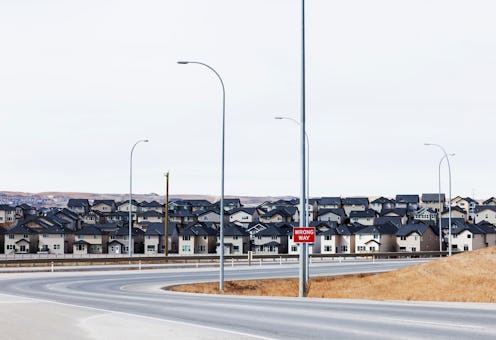Before You Move
The Pros & Cons Of Commuter Towns vs. Being Off The Grid
Introducing “Zoom towns.”
by Kaitlyn Wylde

In How To Move To The Suburbs, Bustle breaks down the challenges and joys of leaving the city in a step-by-step process. In this installment, Kaitlyn Wylde unpacks the four main decisions you need to make once you’ve decided to relocate: new build houses vs. old homes, renting vs. buying, moving home vs. moving somewhere new, and in this column, commuter towns vs. rural neighborhoods.
Commuter Town
The Pros
- You may be able to hold on to your higher-paying job — per Bloomberg, “average wages per worker in urban counties are 26% above those in the higher-density suburbs of the same large metros and 46% above lower-density suburbs” — and have your grassy home life.
- You get peace and quiet. According to the American Psychological Association, hearing and seeing nature regularly doesn’t just make you happier, it also improves attention span and the ability to problem-solve.
- The chance to drive everywhere and follow @subwaycreatures with a reassuring level of detachment.
Tip: Ask your company if they offer pre-tax commuter benefits: You can take up to $270 a month out of your paycheck, tax-free, to cover transportation costs. Also, see if you can buy an unlimited monthly ticket; you can save money and play it fast and loose with the train timetable.
The Cons
- These so-called “Zoom towns” are often pretty expensive, with the real estate and rental market just as competitive as parts of the metro you’re seeking to avoid. Also, commuting expenses can range between $2,000 and $5,000 a year.
- If you’re considering this option for the ease of the commute, you should factor in the mental toll of longer commute times — more stress and anxiety — which might outweigh the benefits of more living space.
- You may have to drive everywhere.
Tried It & Liked It
“The fact that I get to wake up to the sound of birds chirping, take a 40-minute train ride to the city for work, and return to complete silence is the perfect balance for me. I thought I would feel really lonely being this far from the city, but I’ve made friends in my new town and still make it to the city to see my old friends. I’ll never move back.” – Jeanne, 31, teacher in New Jersey
Off The Grid
The Pros
- Studies show that on average, residents of rural towns feel more connected to their community and experience less social isolation than people living in cities.
- So. Much. Space. And more bang for your buck. Per Zillow, rural homes average at $102 per square foot, while urban homes are $231 per square foot.
- Per the Bureau of Labor Statistics, the average cost of living in rural areas is about 9% cheaper than in cities.
Tip: Power outages can affect rural areas more severely. (That’s why they call it “off the grid.”) To prepare for extreme weather events that cause blackouts — hello, climate change! — consider investing in a generator. Even better: You can claim a federal tax credit if you install solar power, which lets you be your own grid.
The Cons
- Much like traditional suburbs, rural communities are becoming more expensive thanks to remote working. Per Redfin, prices rose 11% in 2020, which means you might not save as much as you hope.
- Immersing yourself in nature might sound like a movie you very much want to be starring in, but nature can also be the villain. Depending on your area, expect bears, Lyme disease-carrying deer, or snakes — as well as having to take care of things like post-storm damage on your own.
- Limited resources, like health care and access to food.
Tried It & Liked It
“Moving off the grid is challenging at times. I definitely miss birthday parties and job opportunities by being so far from everything, but my quality of life in the country has improved so much, I think it’s worth it. I have land, I cook all of my meals, and have fewer work distractions and more adventure.” – Becca, 33, travel agent in upstate New York
Interviews have been edited and condensed for clarity.